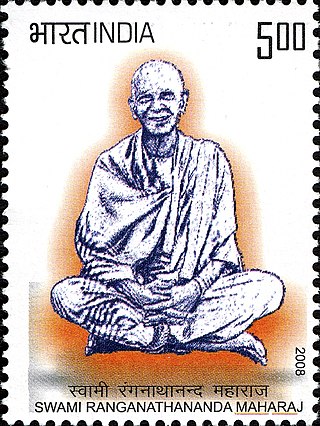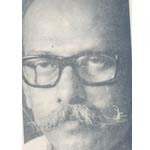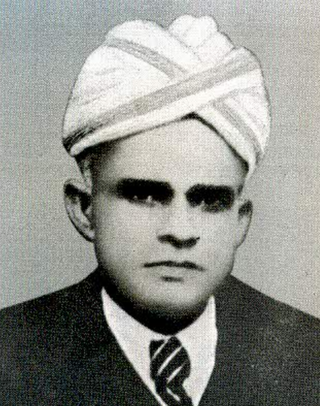
Swami Ranganathananda was a Hindu swami of the Ramakrishna Math order. He served as the 13th president of the Ramakrishna Math and Mission.

Vyloppilli Sreedhara Menon was an Indian poet of Malayalam literature. Known for his works such as Kudiyozhikkal, Kannikkoythu and Mambazham, Menon was the founder president of the Purogamana Kala Sahitya Sangham, an organisation of Kerala-based artists, writers and art and literature enthusiasts. He was a recipient of several honours including Sahitya Akademi Award, Kerala Sahitya Akademi Award for Poetry, Vayalar Award and Odakkuzhal Award.

Panayanthitta Kunhiraman Nair, also known as Mahakavi P, was an Indian writer of Malayalam literature. He was known for his romantic poems which detailed the natural beauty of his home state of Kerala in South India as well as the realities of his life and times. He received the inaugural Kerala Sahitya Akademi Award for Poetry in 1959. He was also a recipient of the Sahitya Akademi Award.

Vellithuruthi Thazhathu Karutha Patteri Raman Bhattathiripad (1896–1982), also known as V. T. Bhattathiripad, was an Indian social reformer, dramatist and an Indian independence activist. He was best known for his contributions in the reformation of the casteism and conservatism that existed in the Namboothiri community. He wrote a number of books which include a play, Adukkalayail Ninnu Arangathekku and his autobiography, Kanneerum Kinavum and many critics consider them as notable works in Malayalam literature. Kerala Sahitya Akademi honoured him with distinguished fellowship in 1976.
P. Kunjanandan Nair, better known by his pseudonym, Thikkodiyan, was an Indian playwright, novelist, lyricist and screenwriter of Malayalam. He was known for his contributions to the genre of radio plays and his autobiography, Arangu Kaanatha Nadan, which detailed the socio-cultural development of Malabar in the post-independent period, fetched him a number of awards including the Kendra Sahithya Academy Award, Kerala Sahitya Akademi Award for Biography and Autobiography, Vayalar Award and the Odakkuzhal Award.
Pala Narayanan Nair was an Indian poet and lyricist, best known for his work, Keralam Valarunnu, written in 1953, comprising eight volumes, which earned him the title of Mahakavi. He wrote more than 5,000 poems, which have been compiled in about 43 anthologies. Nair, who also wrote the lyrics for the 1956 Malayalam movie, Avar Unarunnu, was a recipient of the Ezhuthachan Puraskaram, the highest literary honour of the Government of Kerala as well as Vallathol Award and Kerala Sahitya Akademi Award for Poetry, besides other honours.
N. P. Mohammed, popularly known by his initials N. P., was an Indian novelist, short story writer and screenwriter of Malayalam language. Along with his contemporaries like M. T. Vasudevan Nair, O. V. Vijayan, Kakkanadan, and Madhavikutty, he was known to have been one of the pioneers of modernist movement in Malayalam fiction. He was the president of Kerala Sahitya Akademi and a recipient of several awards including Kendra Sahitya Akademi Award, Kerala Sahitya Akademi Award for Story, Kerala Sahitya Akademi Award for Novel, Lalithambika Antharjanam Award, Padmaprabha Literary Award and the Muttathu Varkey Award.
Vennikkulam Gopala Kurup (1902–1980) was an Indian poet, playwright, translator, lexicographer and story writer of Malayalam. He was the author of a number of poetry anthologies, besides other works, and he translated Abhijnana Shakuntalam, Tulsi Ramayana, Tirukkuṛaḷ, the poems of Subramania Bharati and two cantos of The Light of Asia of Edwin Arnold into Malayalam. He also contributed in the preparation of a dictionary, Kairali Kosham. A recipient of the Odakkuzhal Award and Thirukural Award, Kurup received the Kerala Sahitya Akademi Award for Poetry in 1966. Sahitya Akademi honoured him with their annual award in 1974.
Bodheswaran, , was an Indian independence activist, social reformer and a poet of Malayalam literature. He was known for his nationalistic poems such as Keralaganam and for his involvement in social movements like Vaikom Satyagraha and other related events which led to the Temple Entry Proclamation of 1936.
S. Guptan Nair was an Indian scholar, academic, critic and writer of Malayalam literature. Known for his literary works as well as for his oratorical skills, Nair was a prolific writer with over 35 books to his credit. He was a distinguished fellow of the Kerala Sahitya Akademi and a recipient of several honours including Kendra Sahitya Academy Award, Kerala Sahitya Akademi Award, Vayalar Award, Vallathol Award and Ezhuthachan Puraskaram, the last one being the highest literary award of the Government of Kerala.

C. N. Sreekantan Nair (1928–1976) was an Indian independence activist, a Malayalam writer, short story writer, playwright and screenwriter, best known for his Ramayana trilogy – Kanchana Sita, Saketham and Lankalakshmi. He wrote 10 plays, 4 short story anthologies, book of non-fiction and collected works. Kerala Sahitya Akademi awarded him their annual award for drama in 1962. He was also a recipient of the M. P. Paul Prize.
Vailoppilly Sreehara Menon Memorial Government Vocational Higher Secondary School, commonly known as GVHSS, Ollur, is a vocational higher secondary school situated in Ollur, Thrissur City and run by the state government of Kerala, in India. It is named after the poet Vyloppilli Sreedhara Menon, who served as headmaster from 1936 to 1966.
Vivekodayam is a Malayalam literary journal established in 1904 to serve as a voice of the underprivileged communities in the Indian state of Kerala. It was founded by Kumaran Asan, a prominent poet of malayalam literature, social reformer, disciple of Narayana Guru and founder-secretary of the associated SNDP Yogam, who was inspired by the teachings of Swami Vivekananda.

Sathish Kalathil is an Indian film and documentary director and producer in Malayalam. He is also story writer, and lyricist. His experimental works are well known and appropriately discussed in Malayalam Cinema industry and his debut movie Jalachhayam (2010) was well discussed according to its experimental approach. His first film was Veenavaadanam (2008), an experimental documentary about art (painting). In 2012, he directed Laloorinu Parayanullathu, a social committed documentary film about municipal solid waste.

Digital Film Makers Forum is a public charitable trust registered as a non-profit organisation in India for the promotion of digital films based on Thrissur, Kerala. It is an affiliated Organization to Kerala Sangeetha Nataka Akademi and is organized by a group of amateur filmmakers in Thrissur.
Puthezhath Raman Menon was an Indian writer of Malayalam literature. Known for essays, historical writings, biographies and translations, Menon was the first to translate Tagore's works into Malayalam. He was a judge at the Kerala High Court and was a recipient of the title, Sahitya Kushalan, conferred on him by the Rajah of Cochin. Kerala Sahitya Akademi honoured him with the distinguished fellowship in 1971.
Kuttipuzha Krishna Pillai, was an Indian scholar, journalist, philosopher, atheist and critic of Malayalam language. Counted among the prominent literary critics of the language, he wrote a number of books covering the genres of literary criticism and philosophy. He presided over the Kerala Sahitya Akademi, chaired the advisory board of the Kerala Bhasha Institute as an ex-officio member and was a recipient of the Soviet Land Nehru Award.
T. N. Gopinathan Nair, was an Indian dramatist, novelist, poet, screenwriter and biographer of Malayalam language. One of the prolific among Malayalam playwrights, Nair published 39 plays, besides his four novels, four poetry anthologies and five biographies. He was a member of the council of Kerala Sahitya Akademi and held the char of the Kerala Sangeetha Nataka Akademi. His drama, Pareeksha, received the Vikraman Nair Trophy for the best drama and the Kerala Sahitya Akademi selected his work, Sakshi, for their annual award for drama in 1979.

P. K. Narayana Pillai, better identified as Sahitya Panchanan P. K. Narayana Pillai, was an Indian literary critic, essayist, scholar, grammarian and poet of Malayalam language. One of the pioneers of literary criticism in Malayalam, he wrote more than 25 books which include Panchananante Vimarssthrayam, a critique of the writings of Thunchaththu Ezhuthachan, Cherusseri Namboothiri and Kunchan Nambiar and two books on Malayalam grammar, Leghuvyakaranam and Vyakarana Pravesika. He was a judge of the High Court of Kerala, a member of the Sree Moolam Popular Assembly and the founder president of the Samastha Kerala Sahithya Parishad.








